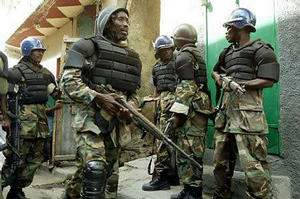Haiti rebels vow to seize Capital after boycotting US peace plan
 The opposition rejected the peace agreement supported by the Organization of American States and fueled by US diplomats.
The opposition rejected the peace agreement supported by the Organization of American States and fueled by US diplomats.
Jean Bertrand Aristide may be living his last hours as president of Haiti, since both the legal and the armed opposition refused to agree the peace plan fueled by the Organization of American States last weekend. Opposition boycott to the initiative –they are not ready to support any plan that calls for Aristide to remain president until new elections are organized- led to a new offensive of the Haitian National Revolutionary Liberation Front, now in control of Cap-Haitian, country's second largest city.
Rebels also said they would attack the Capital soon, if Aristide does not resign, as thousands of looters emptied some shops and homes in Cap-Haitian. Rebel leader Guy Philippe predicted a quick victory over Aristide's partisans, who had erected flaming barricades on the highway into the capital, Port-au-Prince. "I think that in less than 15 days we will control all of Haiti," Philippe said at a Cap-Haitian hotel as he drank from a bottle of beer.
The situation is too precarious in Latin America's poorest country, as the legal opposition remains intransigent on any peace plan that includes a negotiated way out with Aristide, the 200 well equipped men of the rebel army are already in control of the North of the country. They are actually a group of gangsters with links to drug-trafficking and smuggling whose success comes from the complete demobilization of the National Army ordered by the international community in 1995, when Aristide was restored in power.
On Sunday, the OAS diplomatic delegation left Haiti after failing to persuade opponents of President Jean-Bertrand Aristide to end the bloody uprising and accept a U.S.-backed peace plan that would require the two sides to share power in the Caribbean nation. Aristide agreed to the peace plan on Saturday, but his political opponents insisted that the president must step down for there to be peace in Haiti.
The delegation, led by the top U.S. envoy for the Western Hemisphere, the anti-Castrist Cuban American, Roger Noriega, ended its one-day trip to Haiti but said they were optimistic that an agreement could be reached. Aristide, who would remain president under the plan, said he agreed to a new prime minister and government to organize elections.
After talks failed, sources close to the government said several Cabinet ministers in Port-au-Prince were asking friends for places to hide should the capital be attacked by anti-government protesters. It has been said that Aristide has already evacuated his family to avoid criminal retaliation from the outlaws.
On Monday, France urged its citizens to leave Haiti. "We are convinced that all those who have no purpose for being there should not stay," said Foreign Minister Dominique de Villepin on RMC-Info radio. He did not indicate if France had plans to evacuate its nationals. About 2,000 French citizens live in Haiti, mostly in Port-au-Prince, according to French officials.
The United States is reluctant to launch any kind of military operation to control the situation in Haiti and end with the clashes that have already left 70 killed since the rebellion begun early this year. Despite the unrest, people in Port-Au-Prince celebrate carnival, while Aristide’s followers guard the accesses to the capital.
Hernan Etchaleco
Pravda.ru
Subscribe to Pravda.Ru Telegram channel, Facebook, RSS!




